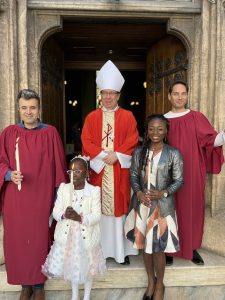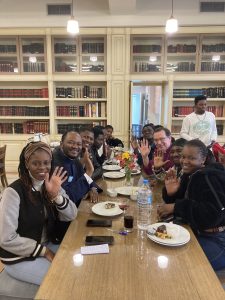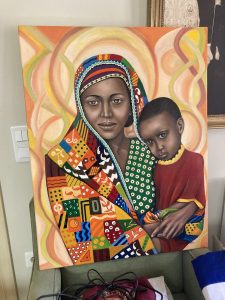A tale of two cities
The two cities we normally associate with that phrase are, of course, London and Paris. Both are cities in which I have been privileged to minister, and which I hold in great affection. But I want to write about my recent trip to two quite different cities – to Hull and Athens.
I grant you that, unlike London and Paris, Hull and Athens aren’t normally paired in people’s minds. But they might have more in common than you might think (and not just because I recently visited them). But first, let me explain I was doing in them both.
 In both, I was responding to long-delayed invitations to speak on the subject of Freedom of Religion or Belief, following the work I did a few years ago for the Foreign Office on the persecution of Christians. That work both led (to my great surprise) to a change in government policy, and has become an enduring passion of mine – a cause which I believe God has laid on my heart to continue to champion.
In both, I was responding to long-delayed invitations to speak on the subject of Freedom of Religion or Belief, following the work I did a few years ago for the Foreign Office on the persecution of Christians. That work both led (to my great surprise) to a change in government policy, and has become an enduring passion of mine – a cause which I believe God has laid on my heart to continue to champion.
In Hull, I was invited to deliver the William Wilberforce Lecture, in honour of Hull’s greatest son: the great champion of the cause of the abolition of slavery. It was good to be back in the city not only where Wilberforce was born, and which he represented in Parliament, but in which I myself used to live. Indeed I worked out that the last time I had been in the room in the Guildhall where I spoke was in the early 70s for a children’s fancy dress party!
And it was, I felt, a very fitting subject to speak on there (watch the video here). Today, many, many people the world over are having their rights compromised, and their livelihoods – and their very lives – threatened, simply because they belong to religious minorities. Their lives and livelihoods are threatened through oppressive governments which combine, to varying degrees, a toxic mix of authoritarianism, nationalism and fundamentalism. Look at the fate of the Rohingya in Myanmar, the Uighurs in China, and Christians in the Middle Belt of Nigeria – to cite just three examples. The fate of religious minorities in the world’s two most populous countries, in India and China, is much more precarious than it was a decade ago.
‘You may choose to look the other way, but you can never again say you did not know’
As I said in Hull, I have no doubt that this was a cause about which Wilberforce would have cared deeply, such was his concern for freedom and liberty. When he presented Thomas Clarkson’s monumental report on the slave trade to the House of Commons at the start of their great campaign he said this, ‘You may choose to look the other way, but you can never again say you did not know.’ I closed my lecture in Hull with those words – and with a prayer that we would indeed look this problem full in the face.
And so from there, I headed off to Athens for a very full four days of meetings and events. On the Sunday it was great joy to preach and preside at St Paul’s, the Anglican Church in the city, where I also conducted a baptism and confirmation and received two people formally into the Church of England.
I was accompanied by my friend, Charles Hoare, who worked with me on the Foreign Office review, and together we had meetings in key government departments, including the Ministry of Foreign Affairs, with the deputy mayor of Athens, and with the British Ambassador. And, yes, we did find time to visit the Acropolis and the Areopagus, where Paul famously preached, along with an occasional meal in a delightful taverna or two.
 One particularly joyful visit was to a church of the Patriarchate of Alexandria. Orthodoxy ‘divides’ the world into different patriarchates: individual churches which take responsibility for particular countries or areas. The Patriarchate of Alexandria looks after all of Africa, no less, and at that church it was a great joy to meet a number of young people from that great continent. Some of them were refugees from Congo, a country fraught with violence, who had hazarded the risky crossing of the Aegean from Turkey to Greece on inflatable boats. It was a joy to hear them sing and to chat with them but sobering too to hear something of their challenging stories.
One particularly joyful visit was to a church of the Patriarchate of Alexandria. Orthodoxy ‘divides’ the world into different patriarchates: individual churches which take responsibility for particular countries or areas. The Patriarchate of Alexandria looks after all of Africa, no less, and at that church it was a great joy to meet a number of young people from that great continent. Some of them were refugees from Congo, a country fraught with violence, who had hazarded the risky crossing of the Aegean from Turkey to Greece on inflatable boats. It was a joy to hear them sing and to chat with them but sobering too to hear something of their challenging stories.
The main reason for my visit, however, was that I had been asked to give a keynote address at the Office of the Holy Synod of the Greek Orthodox Church. Fr Leonard of St Paul’s, our generous host for the visit, believes that I might be the first non-Orthodox leader to be invited to speak there: a great honour. We followed the address with a very rich discussion – conducted, very graciously, as far as I was concerned, in English!
But – apart from the invitation – why go to Greece? A number of significant things have happened since my review for the Foreign Office was published. One is that we have set something up called the UK Freedom of Religion or Belief Forum (UKFF for short) which draws together around 90 UK-based civil society groups to make common cause on this issue. Another is that 42 nation states, Greece and the UK included, have become part of the International Religious Freedom or Belief Alliance (IRFBA).
So we encouraged those we met in Greece to consider setting up something similar to the UKFF, and we also wanted to encourage our Greek friends to take full advantage of Greece’s membership of the IRFBA.
 For there is no doubt that Greece has a distinctive contribution to make to this global cause. They are the only country in the Alliance whose main tradition is Orthodoxy. And – very tellingly – they are the only country in the Alliance which has in its collective memory the experience of being ‘dhimmi’, the secondary (albeit protected) status conferred on non-Muslims in the Ottoman Empire: an empire of which, of course, Greece was once a part. Both those perspectives bring a particular richness to Greece’s engagement in this international cause.
For there is no doubt that Greece has a distinctive contribution to make to this global cause. They are the only country in the Alliance whose main tradition is Orthodoxy. And – very tellingly – they are the only country in the Alliance which has in its collective memory the experience of being ‘dhimmi’, the secondary (albeit protected) status conferred on non-Muslims in the Ottoman Empire: an empire of which, of course, Greece was once a part. Both those perspectives bring a particular richness to Greece’s engagement in this international cause.
Something of more contemporary seriousness is going on too. There is a great crisis currently in the global Orthodox community. I had only really become aware of it through the war in Ukraine, but in truth it predates it. Essentially the Russian Orthodox Church, so closely aligned with President Putin, is pursuing a similar kind of aggrandising agenda. This became clear to us particularly in discussion with the delightful Metropolitan of the Patriarchate of Alexandria, who explained how the Moscow Patriarchate is seeking to undermine its authority in Africa and claim it for its own. The pattern is depressingly familiar.
This is undoubtedly bad news. The situation for religious freedom in Crimea, for example, has become significantly worse since its illegal annexation. We need to guard against that being replicated elsewhere.
As I frequently argue, Freedom of Religion or Belief is not a ‘side-bar’ issue for a few ‘religious’ people. Like slavery in Wilberforce’s day, it is an issue of pressing importance in today’s world. It’s an issue I have no doubt he would have passionately espoused. And there’s no doubt in my mind that it’s an issue that we all need to espouse with some passion too. I believe that if, in Cornwall, we believe in the spirit of ‘One and all’ we should care about this issue too – for those whose livelihoods and lives are under threat the world over are indeed our neighbours.
